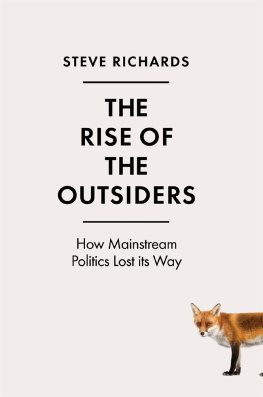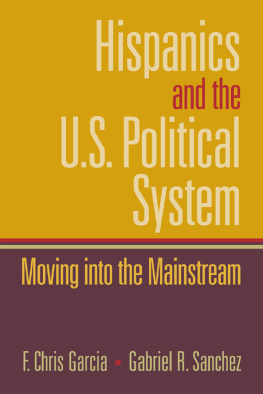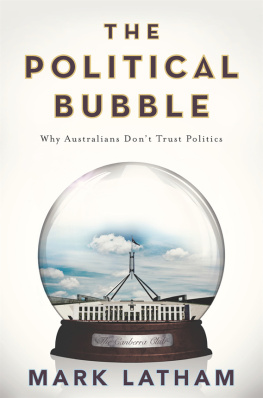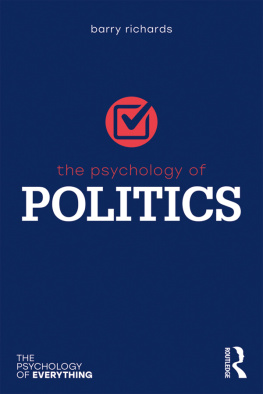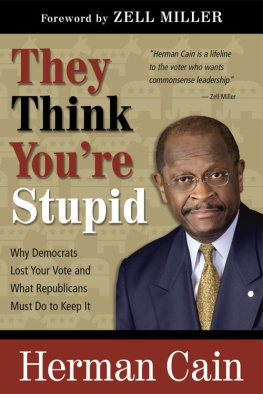______
CONTENTS
______
INTRODUCTION
A pattern forms. There are many jagged edges and there is no neat uniformity, but across much of the democratic world, outsiders trigger volcanic political explosions, in some cases by winning power or by forcing more mainstream governments to change direction, with historic consequences.
The outsiders are varied, but in an era of vague slogans and assertions they are easily defined. Some are from the right and some from the left, but they come from outside orthodox mainstream democratic politics. A lot of them are not elected to their national parliament. Most of those who are elected have not been close to government. That is what makes them outsiders, or allows them to claim to be from the outside. What is relatively new is that the outsiders have made waves in supposedly robust liberal democracies across the Western world. Their rise is explored in this book.
The pattern started to take vivid shape when UKIP (the UK Independence Party) secured more votes than any other UK party in the European elections in the summer of 2014. At the start of 2015 the left-wing party Syriza won the election in Greece. During the rest of 2015 support for far-right parties across the European Union (EU) start to increase significantly, a rise that had begun several years earlier. In Spain and Portugal left-wing parties appeared from nowhere and shook up the political landscape. In the UK general election in 2015 the SNP (Scottish National Party) won virtually every seat in Scotland, nearly wiping out the once-dominant Labour Party. And in its leadership contest in 2015 the UKs Labour Party elected the left-wing rebel, Jeremy Corbyn, to be its new leader. The veteran Corbyn won a landslide. In the same year Marine Le Pens Front National made huge gains in local elections, coming first in six of Frances thirteen regions. In 2016 the UK voted to leave the European Union, against the advice of the prime minister, all living former prime ministers, the leader of the Opposition and President Obama. A few months later Donald Trump was elected President of the US, as Obamas successor. Trump was a supporter of Brexit the proposition that the UK should leave the EU and had accurately proclaimed during his campaign that Brexit was a sign that he would win, too. The voters were in revolt against their traditional rulers.
The pattern of volcanic significance takes firmer shape when turning to the mainstream. Many mainstream parties have suffered a crisis of identity that partly explains the rise of the outsiders, and in turn boosts their ascendancy further. In the US, Democrats wonder how they failed to connect with once-reliable supporters in the presidential election in 2016. Republicans do not know whether to celebrate a presidential victory or distance themselves from it. The UK Labour Party has held two leadership contests since the 2015 election and has elected the same leader on both occasions whacky behaviour that is a symptom of deep unease. The UK Conservative Party lost a prime minister a year after he unexpectedly won an election, and staged its own bizarre leadership contest that was over within days as much a symptom of deeper unease as Labours conduct. In Germany, Angela Merkel was forced to change her approach to the asylum crisis not because she believed she was wrong, but because her party panicked about the electoral consequences. In France, President Hollande did not dare to stand for a second term, fearing that he would be annihilated. And the former President Sarkozy failed in his attempt at a comeback part of the recent past that is near-fatal terrain for mainstream leaders. In the US, Hillary Clinton was not helped by her surname and by her own vocation as a long-serving politician. In Greece, mainstream parties on the left and right agonize about their purpose, after ruling together. Many coalition partners across Europe suffer the same neuroses, as they look nervously to the left and right of their own vaguely defiant positions.
The jagged edges of the pattern are important, too. Outsiders across the democratic world are intimidatingly strong and yet transparently weak. They win power. They bring about historic change. They influence policy, even when still distant from securing national power. These are extraordinary achievements for political novices, like winning Wimbledon or the US Open, having played only a few games at the local park. Yet in most cases the outsiders are pathetic, fragile, inconsistent, inexperienced and often quite silly, the last quality being especially dangerous for those wishing to be taken seriously on the political stage. They espouse causes erratically and have no secure base on which to build. Their purpose is often unclear and the internal divisions are played out in public. As politicians, they are both mighty and hopeless.
Perhaps the ambiguity of their powerful and weak position explains why each time an outsider wins an election or secures a significant increase in support, nearly everyone appears to be taken aback: voters, the media and sometimes the bewildered outsiders themselves, responding to success they had not anticipated or prepared for. On one level, the fragilities are so deep that there is cause for astonishment each time an outsider rises from nowhere. On another level, the surprise is that any of us are still surprised. The pattern forms in front of our eyes.
Across much of the democratic world, large numbers of voters are turning away from mainstream politicians and looking to those who come from the outside to rescue them from tumultuous change. Some outsiders soar from the left as well as from the populist right. A few of them rise fleetingly, only to decline just as fast when fatal flaws are exposed. On occasions, mainstream parties or individual liberal progressives get their act together and win elections with a confident flourish. The US elects Donald Trump. Canada elects Justin Trudeau. Austria nearly elected a far-right president, but in the end chose a progressive member of the Green Party in the 2016 election.
In March 2017 Hollands centre-right prime minister, Mark Rutte, was re-elected, defeating the far rights Geert Wilders by a relatively wide margin, and yet Wilders party made gains. The result in Holland, and the reaction to it, showed how electoral assumptions had changed. Although performing less well than Wilders had hoped, his Party for Freedom came second in terms of the number of seats won. Wilders had set the agenda for much of the campaign. At times Rutte appeared to be racing to keep pace with the far-right leader and may have profited from the hard line that he drew in a diplomatic stand-off with Turkey towards the end of the contest.
For Rutte, the electorally convenient row erupted over his refusal to allow two Turkish ministers to address rallies in Rotterdam. The ministers had planned to speak about the referendum aimed at giving Turkeys President Erdogan greater powers. The controversy gave Rutte an opportunity to be perceived as a strong leader, in refusing to bow to foreign pressure. To some extent, he danced to Wilders populist tunes as he headed towards his victory.
On the other side of the political spectrum, support for the mainstream Labour party collapsed, while backing for the Greens rose significantly. The Greens won several more seats than Labour, establishing them as the most formidable parliamentary and electoral force on the left. Such were the fearful expectations, in turbulent times, that mainstream leaders across the European Union expressed relief at the outcome of an election that had been shaped by Wilders agenda and in which his party made some gains, while the Greens surpassed what had been the main centre-left party in Holland.

